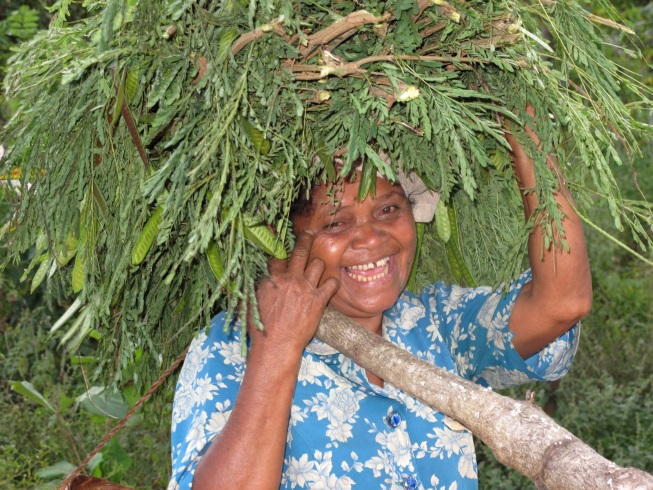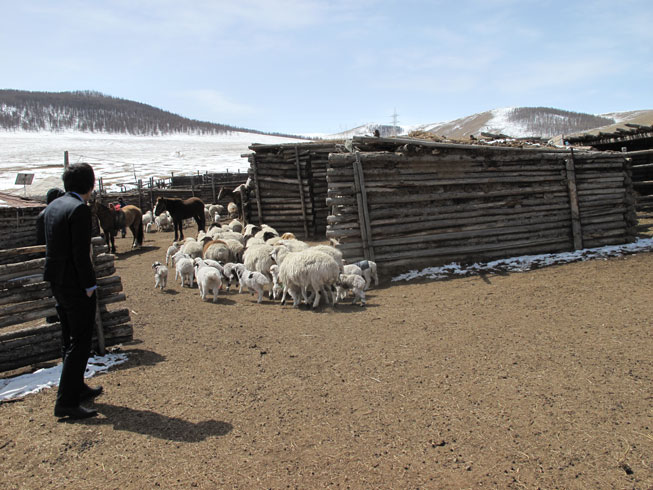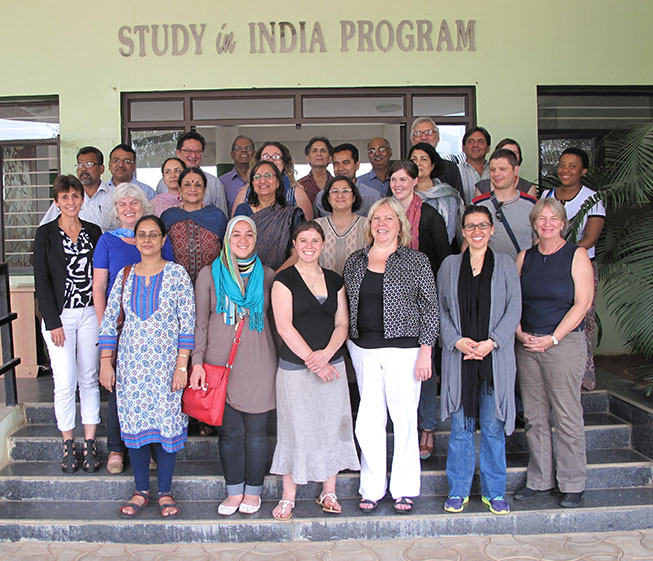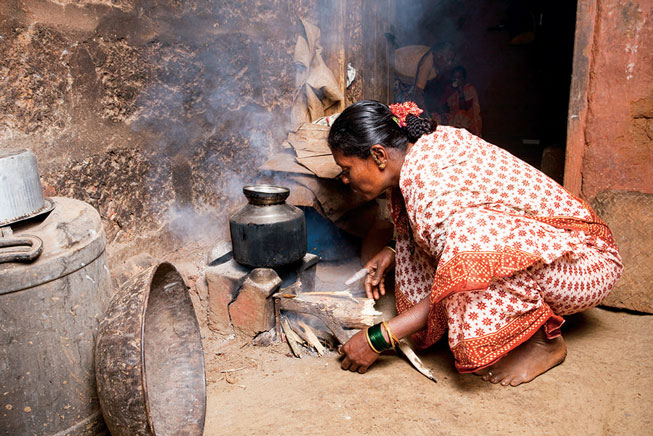Current projects
Improving the lives of Indonesian cattle farmers
 CfCSC Director Elske van de Fliert is contributing her CSC expertise to the project ‘Improving smallholder cattle fattening systems based on forage tree legume (FTL) diets in Eastern Indonesia and Northern Australia’.
CfCSC Director Elske van de Fliert is contributing her CSC expertise to the project ‘Improving smallholder cattle fattening systems based on forage tree legume (FTL) diets in Eastern Indonesia and Northern Australia’.
The project, funded by the Australian Centre for International Agricultural Research (ACIAR), works with smallholder cattle farmers in Lombok, Sumbawa, West Timor and Sumba.
Elske's role has included conducting a diagnostic Situation Analysis study, building participatory research and communication skills among junior field researchers, and designing an outreach strategy to engage smallholder farmers in implementation of improved FTL-based cattle managed systems.
Through an agreement with ACIAR and the CfCSC, an outreach strategy is being piloted on a larger scale and impact assessment case studies are being conducted.
During this phase we are working with CfCSC PhD alumna Dr Nurul Hilmiati who is now the Head of Collaboration and Assessment Services Division at Indonesia's Assessment Institute for Agricultural Technology.
The smallholder cattle farming project provides an interesting case to explore the mechanisms for a transdisciplinary approach to research for development.
It experiments with communication methods to align scientists, agricultural extension services and rural communities in their collaborative effort to achieving outcomes that eventually benefit families who are living on small pockets of land.
The project is led by the Associate Professor Max Shelton of the UQ School of Agriculture and Food Sciences (SAFS).
Other partners are the Assessment Institutes for Agricultural Technology in NTB and NTT provinces, the University of Mataram and CSIRO.
Detailed progress reports can be found on ACIAR's website.
Sharing knowledge through herder service centre in Mongolia
 The Centre for Communication and Social Change (CfCSC) in collaboration with UQ International Development has won a tender for the Extension Component of the Green Gold - Phase IV project in Mongolia.
The Centre for Communication and Social Change (CfCSC) in collaboration with UQ International Development has won a tender for the Extension Component of the Green Gold - Phase IV project in Mongolia.
The Green Gold project is funded by the Swiss Agency for Development and Cooperation (SDC) and started in 2004 to promote collective actions for sustainable rangeland management and improving herders’ access to knowledge and markets in western Mongolia.
The new Extension Component of Phase IV of the project involves the establishment and operationalisation of communication services to facilitate access for herders to practicable knowledge and opportunities for exchange and collective action.
Centre Director Elske van de Fliert will lead the project team, which will further involve CfCSC affiliate Dr Erdenebolor Baast, an agricultural extension specialist from the Association for Sustainable Rural Development (ASRD) in Mongolia and PhD candidate Grady Walker, environmental education specialist and participatory video expert.
The Centre’s approach to the implementation of GG IV calls for well-informed individual decision making as well as collective planning and action at the farm household and community level. The project methodology applies interactive participatory approaches and works from the principle of facilitation of access to information, services, technologies and learning, and exchange opportunities.
In March 2015, Centre research assistant Grady Walker traveled to Khovd, Mongolia, to facilitate a Participatory Video (PV) Training of Facilitators (ToF). This training was an element of the participatory communications approach being implemented by the agricultural extension component of the Green Gold project. The training involved the participation of teams from five soums in Khovd Aimag. Each team was composed of a pair of individuals: the first was a member of the Association of Pastoral User Groups (APUG) and the second was from the Animal Husbandry Breeding Units (AHBU). In addition to these ten participants, two other individuals attended the training. One was a project officer from the Swiss Development Corporation’s (SDC) breeding project, and the other was a local agricultural extension officer and CfCSC partner who had previous experience working with video-based participatory approaches.
The training was a practical skills-based workshop aimed at developing the capacity for participants to use video in their operations within the parameters of the project.
The project timeframe is slightly over three years (Nov 2013 – Dec 2016) and the volume of funding is CHF 1.7 million (approximately AUD $2 million).
Supporting smallholder cattle farmers in Timor Leste
The Centre’s CSC work in Timor Leste continues in 2016, with Phase Two of the smallholder cattle production project being awarded funding by the Australian Centre for International Agricultural Research (ACIAR).
Building on Phase One, which ran from 2012 to 2015, the overall aim of the project is to improve the livelihoods of small-scale farmers by supporting them to make their livestock systems more productive.
CSC specialists on the team include Centre director Elske van de Fliert, PhD alumna Nurul Hilmiati and Master’s student Trilce Patron-Lecca.
Associate Professor Elske van de Fliert says Phase Two of the project is focussed on facilitation and capacity building.
“Phase One taught us that the problems aren’t the lack of science, but adapting science to the specific conditions of the existing livestock system,” she says.
In Phase Two, research will be conducted and analysed collaboratively through the 'KAMODI Network' of farmers, traders, researchers and agricultural extension officers.
“Long-term capacity building is crucial for the next phase and the challenge will be to keep people involved to the end and use that capacity,” Elske says.
“The other challenge will be to feed into policy changes for rural development so that the structures and processes established in this project will continue and be institutionalized.”
Participatory Video (PV) is being used to help establish the network by providing a process for awareness raising, needs and opportunity assessment, and vision building by community members.
The CfCSC is working with project leader Mr Geoffrey Fordyce from QAAFI, research fellows Dr Simon Quigley and Dr Scott Waldron from the School of Agriculture and Food Sciences, Dr Dahlanuddin and colleagues from Mataram University and BPTP NTB (Indonesia), and local staff from the Timor Leste Ministry of Agriculture and Fisheries, the National University of Timor Lorosa'e and district technical and extension officers.
Centre heads global research initiative for rural communication
 The Centre for Communication and Social Change at UQ is leading the Global Research Initiative (GRI) for Rural Communication. The Centre is working with members from the Food and Agriculture Organisation (FAO), Wageningen University, University of Guelph, University of Reading, and University of the Philippines Los Baños.
The Centre for Communication and Social Change at UQ is leading the Global Research Initiative (GRI) for Rural Communication. The Centre is working with members from the Food and Agriculture Organisation (FAO), Wageningen University, University of Guelph, University of Reading, and University of the Philippines Los Baños.
The GRI seeks to mainstream communication for development into the wider development agenda and practice, and has been formed by the leading research institutions in the field. They aim to collaborate and lead research into communication for development and social change. A first collaborative activity emerged from the FCCM in the form of a research project on ‘Evidence-based approaches for rural communication services’ commissioned by FAO to the GRI and coordinated by the UQ CfCSC.
The GRI alfeady has a track record of organising activities to place ComDev on the agenda of development and communication–related international conferences, meetings and events. In 2015, the GMI led two symposia at the 22nd European Seminar on Extension and Education (ESEE) in Wageningen, The Netherlands, and a panel presentation at the IAMCR Conference in Montreal, Canada.
In terms of research and capacity building, GRI has identified several possible areas of work: mapping e-learning modules and higher education courses on rural communication; mapping community for development research and methodologies; fielding student assistants for such activities and for internships in FAO projects; considering a global PhD course (similar to WASS structure) to be held in Rome in close connection with FAO and the University of Perugia; conducting an inventory of shared sources (text books, learning environments); using and actively contributing to the recent publication of Communication for Rural Development Sourcebook; and promote exchange through visiting scholars and fellowships.
Centre Director Associate Professor Elske van de Fliert said that, "The ComDev GRI provides a unique opportunity for academics and practitioners across the world to share experiences and models for rural communication implementation and evaluation, and to collaborate on research projects that raise awareness about the key role that communication plays in sustainable development".
The GRI formed as a follow up of a pre-conference on ‘Communication for Sustainable Rural Development and Social Change’ organised by representatives from the above organisations at the International Association for Media and Communication Research (IAMCR) Conference in Hyderabad in July 2014. A workplan was consolidated after the GRI members participated in the ‘Forum on Communication for Development & Community Media for Family Farming’ (FCCM) organised by FAO in October 2014.
For more information on the initiative, please visit Com Dev and Community Media for Family Farming forum and join the discussion.
Peatland community Engagement & Transdisciplinary Learning - Indonesia (PEATLI)
Read more about PEATLI here.
Supporting UQ's Energy & Poverty Research Group
 The Centre for Communication and Social Change (CfCSC) is a member of the Energy & Poverty Research Group (EPRG). CfCSC director Elske van de Fliert is an academic associate of the project and advises two PhD candidates in the group: Yuwan Malakar and Matthew Herington. Matt and Yuwan’s research projects focus on the enablers and barriers (respectively) to sustainable energy transitions and social change, with a particular interest in India and Nepal. Elske also provides CSC expertise to the EPRG initiative at large.
The Centre for Communication and Social Change (CfCSC) is a member of the Energy & Poverty Research Group (EPRG). CfCSC director Elske van de Fliert is an academic associate of the project and advises two PhD candidates in the group: Yuwan Malakar and Matthew Herington. Matt and Yuwan’s research projects focus on the enablers and barriers (respectively) to sustainable energy transitions and social change, with a particular interest in India and Nepal. Elske also provides CSC expertise to the EPRG initiative at large.
The EPRG incorporates the disciplines of engineering, economics and business, communications and social change, and behavioural science to support enabling environments to effect change in impoverished communities. Bringing together research capability and innovation across disciplines, the group explores sustainable, reliable and affordable energy systems that are tailored to regions and societal conditions.
Established by the UQ Energy Initiative and School of Chemical Engineering in 2013, the mission of the EPRG is to support positive social, environmental and health outcomes that are vital for sustainable and productive livelihoods in energy impoverished communities in the developed and developing world.
Read more at the EPRG web page.
